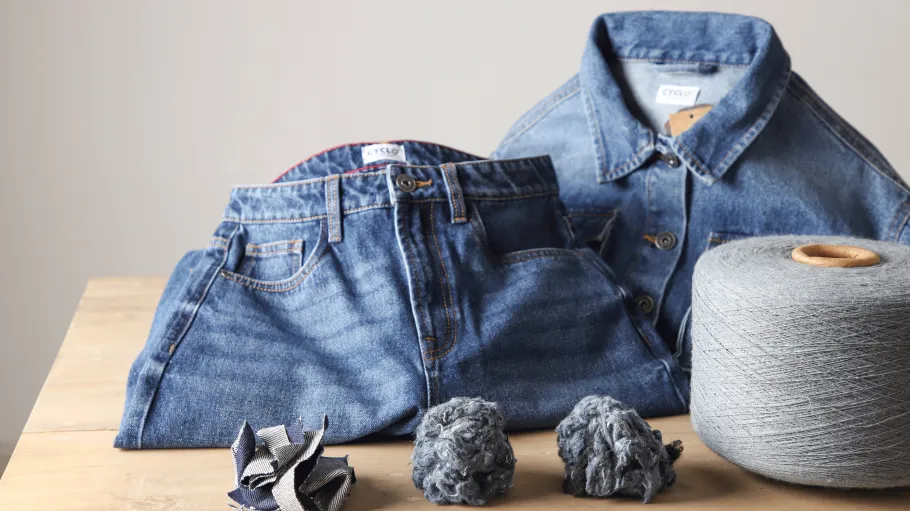Cyclo is on a mission to scale closed-loop production by focusing on one of the most cotton-rich apparel categories. The Bangladeshi textile recycling mill is stepping further into the global jean market with a collection of denim fabrics made with up to 95 percent Cyclo recycled cotton.
Cyclo Denim debuted at Kingpins Amsterdam in October with two main fabric blends: a 95 percent Cyclo recycled cotton and 5 percent recycled polyester fabric, and a 90 percent Cyclo recycled cotton and 10 percent Tencel lyocell fabric. The recycled cotton can be used in both warp and weft for rigid fabrications.
For stretch, Cyclo offers a version that applies recycled cotton to the warp combined with a traditional yarn containing spandex in the weft. However, it is still able to achieve over 50 percent recycled cotton in the final garment. The yarn is also produced in different counts to achieve light and heavy-weight garments.
Mustafain Munir, Cyclo fibers president, said the company is particularly excited about the Tencel fabrication because it not only improves the fabric’s hand feel but also enhances its circularity, making it easier to recycle at the end of its life as it is doesn’t contain synthetics.
Cyclo aims to fill the category’s void for alternative ingredients that are both economically and environmentally sustainable for mass adoption. Munir pointed out the sustainable benefits of using Cyclo recycled cotton such as reduced water and energy usage compared to virgin cotton. The firm uses a mechanical recycling process that does not use any water, dyes or chemicals.
In addition to pricing hurdles, fiber length has always been the limiting factor for recycled cotton. “We used a combination of new and existing machinery to be able to achieve the longer fibers needed to reach our recycled percentage goals at scale. Investment was needed in customizing components within the machines and adding processes to maximize the yield of longer fibers and reduce the prevalence of shorter ones,” Munir said.
Aside from the financial investment, Munir said a collaborative approach was the real key to ensure that fabrics made with Cyclo can withstand denim’s wash and finishing processes. “It took a couple years of trial and error. We relied on feedback from the weaving mills, laundries and designers to modify our recycling and spinning process in order to get the product right,” he said.
Denim was a natural next step in Cyclo’s mission to scale circularity. “We’ve always been bold in elevating circularity standards by making products with high recycled content that can also be recycled,” Munir said.
The market is responding positively to Cyclo Denim. “We have a very high level of interest from existing and new customers. The best feedback you can hear as a recycled cotton manufacturer is that the product matches or exceeds the virgin quality,” Munir said.
Cyclo worked with the Dhaka-based design and virtual manufacturing firm Dreüss Worldwide to develop the concept collection presented at Kingpins Amsterdam. “They used their extensive knowledge in fabrication and washes to work with a couple different mills and laundries in order to get the look, feel and performance of the fabric,” Munir said.
Cyclo fiber is currently produced in the company’s own factory in Bangladesh. However, the company is looking at developing the capabilities in Pakistan next year.
“Our current line is set up for over 200 tons of fiber per month. Based on the positive response we got at Kingpins from the large retailers, we are already in the process of converting another recycling line to denim to double that capacity in early 2025,” Munir said.

